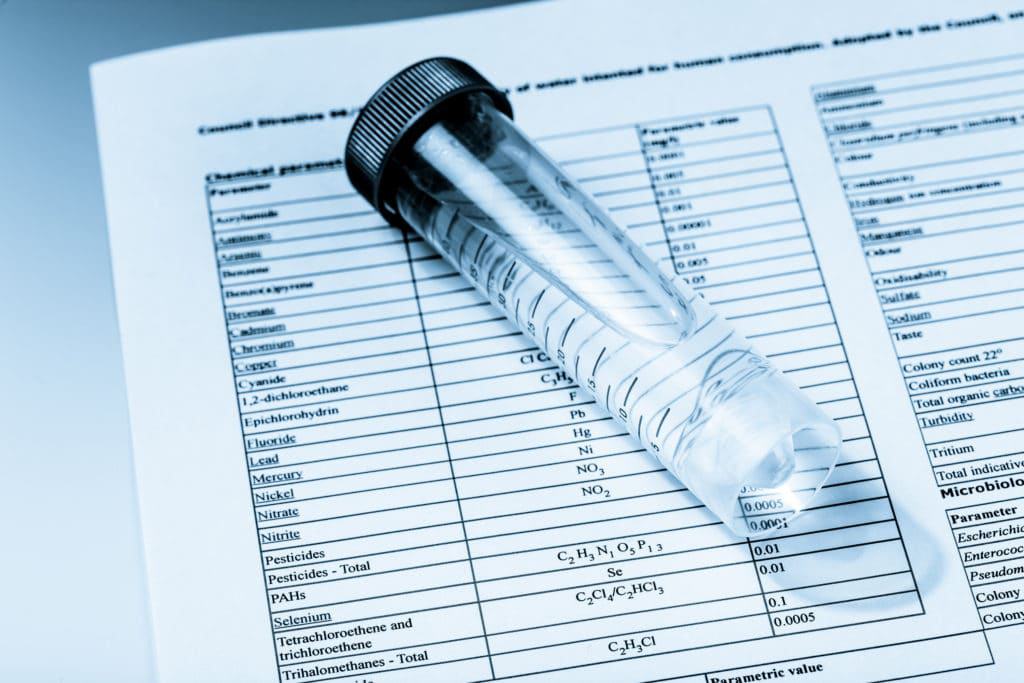As a homeowner with well water, you may wonder how you can know if your water needs testing and how often you should test it. We recommend every two years as a minimum; every year is preferable. Regardless of the schedule you choose, there are telltale signs that your water may need testing now—you should be alert to these five indicators.
1. Discoloration: A rusty, reddish hue or even orange or yellow color to the water is a sign you need to have the water tested. Off-color water can come from tannins which cause discoloration of the water and turn it somewhat reddish or yellow. Iron bacteria can also occur in well water. When bacteria combine with iron, manganese, and oxygen, it results in yellowish water in your groundwater supply. Also, rust in the pipes, such as when the water has been turned off for some time, can turn the water reddish. This is because any rust that was in the system will become dislodged when the water supply is turned back on.
2. Foul-smelling water: A sulfur or rotten egg smell or other unpleasant odor can be a sign of a few things. Most often (99% of the time), the sulfur smell comes from bacteria. Bacteria give off waste in the form of gas. In a closed-water system, you get high amounts of bacteria giving off this bad-smelling gas. Foul odors can also occur as a result of sulfur-containing chemical reactions in the groundwater. If you have a private well and experience odorous water, you need to have your well tested for bacteria.
3. Household members becoming ill: Not just seasonal colds but stomach or respiratory problems can be caused by contaminated well water. Stomach issues can range from a slightly upset tummy to something as serious as dysentery, which comes from bacteria. Other deadly diseases which can be caused by bacterial contamination of water include typhoid fever, cholera, infectious hepatitis (caused by hepatitis A or E virus) and diseases caused by Shigella spp. and E. coli O157. If you see that your household members are coming down with any illnesses other than just seasonal colds, it is a good idea to test your water.
4. Cloudy water: Residues on your glassware in the dishwasher or your shower water appearing cloudy can be caused by certain mineral residues in your water supply. Some of these may not be harmful to your health but are annoying if you want your glassware to look clean. The minerals that may contribute to cloudy water include high levels of dissolved calcium and magnesium. These two minerals can enter your water supply when your aquifer sits in limestone or dolomite which contain calcium and magnesium along with plenty of silica and clay. These impurities can leach into the water in your well causing it to become cloudy. You should test your water if you see it is cloudy. The testing lab will be able to determine the exact cause and may be able to recommend water treatment to handle it.
5. Abnormal blood tests: If you or a family member had lab blood work showing metal contamination, this is another important reason to have your water tested. But how does metal get into the water? The most common metal pollution in freshwater comes from mining companies. Other sources of metal in the drinking water can be from leaching of metals such as lead from the pipes. The most common sources of lead in drinking water are lead pipes, faucets, and plumbing fixtures. Certain pipes that carry drinking water from the water source to the home may contain lead. Household plumbing fixtures, welding solder, and pipe fittings made prior to 1986 may also contain lead.
Other types of heavy metals commonly found in water include manganese, copper arsenic, and chromium. It’s important to note that some of these heavy metals are essential for healthy biochemical function; however, metals such as arsenic, lead, and chromium can be toxic when ingested in small or large quantities.
If you notice any of these five signs, test your well water right away. If not, you should test it a minimum of every two years unless you notice anything is awry; then test it more often. For homeowners with a private well in a home older than two years who’ve never tested their water, we recommend you do so right away.
To find out more about the right way to fully test your well water, please contact ETR Labs at (800) 344-9977 or visit our water test kit page to purchase a well water testing kit.

